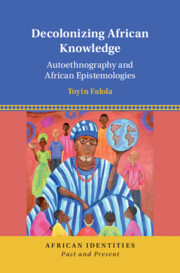Book contents
- Decolonizing African Knowledge
- African Identities: Past and Present
- Decolonizing African Knowledge
- Copyright page
- Dedication
- Contents
- Figures
- Notes on Language and Orthography
- Preface
- Acknowledgments
- Part I Introduction
- Part II History, Fictions, and Factions
- 3 Narrative Politics and Cultural Ideologies
- 4 Memory, Magic, Myth, and Metaphor
- 5 A Poetological Narration of the Nation
- 6 A Poetological Narrative of the Self
- 7 Satire and Society
- 8 Narrative Politics and the Politics of Narrative
- Part III Visual Cultures
- Part IV Conclusion
- Bibliography
- Index
3 - Narrative Politics and Cultural Ideologies
from Part II - History, Fictions, and Factions
Published online by Cambridge University Press: 23 June 2022
- Decolonizing African Knowledge
- African Identities: Past and Present
- Decolonizing African Knowledge
- Copyright page
- Dedication
- Contents
- Figures
- Notes on Language and Orthography
- Preface
- Acknowledgments
- Part I Introduction
- Part II History, Fictions, and Factions
- 3 Narrative Politics and Cultural Ideologies
- 4 Memory, Magic, Myth, and Metaphor
- 5 A Poetological Narration of the Nation
- 6 A Poetological Narrative of the Self
- 7 Satire and Society
- 8 Narrative Politics and the Politics of Narrative
- Part III Visual Cultures
- Part IV Conclusion
- Bibliography
- Index
Summary
This chapter explores cultural themes in Africa with “narrative politics” and its cultural values central to the discourse. In expounding “narrative,” the chapter brings to the fore its two most potent modes (literature and history), which reflect reality but are different in their modus operandi – through imagination (creativity) and verifiable facts. Written beautifully and with references, this chapter blurs the contrast between the two “narrative devices” and focuses instead on espousing their working togetherness. This is because a co-adoption of both in the narrative adds creativity to facts presentation, which thus makes it interesting to read and sustain readers’ interest just as their Yoruba derivative, Alo and Itan, is often a mixture of both.
The chapter also asserts the importance of autoethnography and how through personal experience and identity, the society’s “collective consciousness” is exhibited and manifested. Also, there are references made to the cultural relevance and implication of “time and season,” “taboos and superstitions,” “greetings and reverence,” as well as “namings and places” in Yorubaland.
Keywords
- Type
- Chapter
- Information
- Decolonizing African KnowledgeAutoethnography and African Epistemologies, pp. 45 - 69Publisher: Cambridge University PressPrint publication year: 2022

